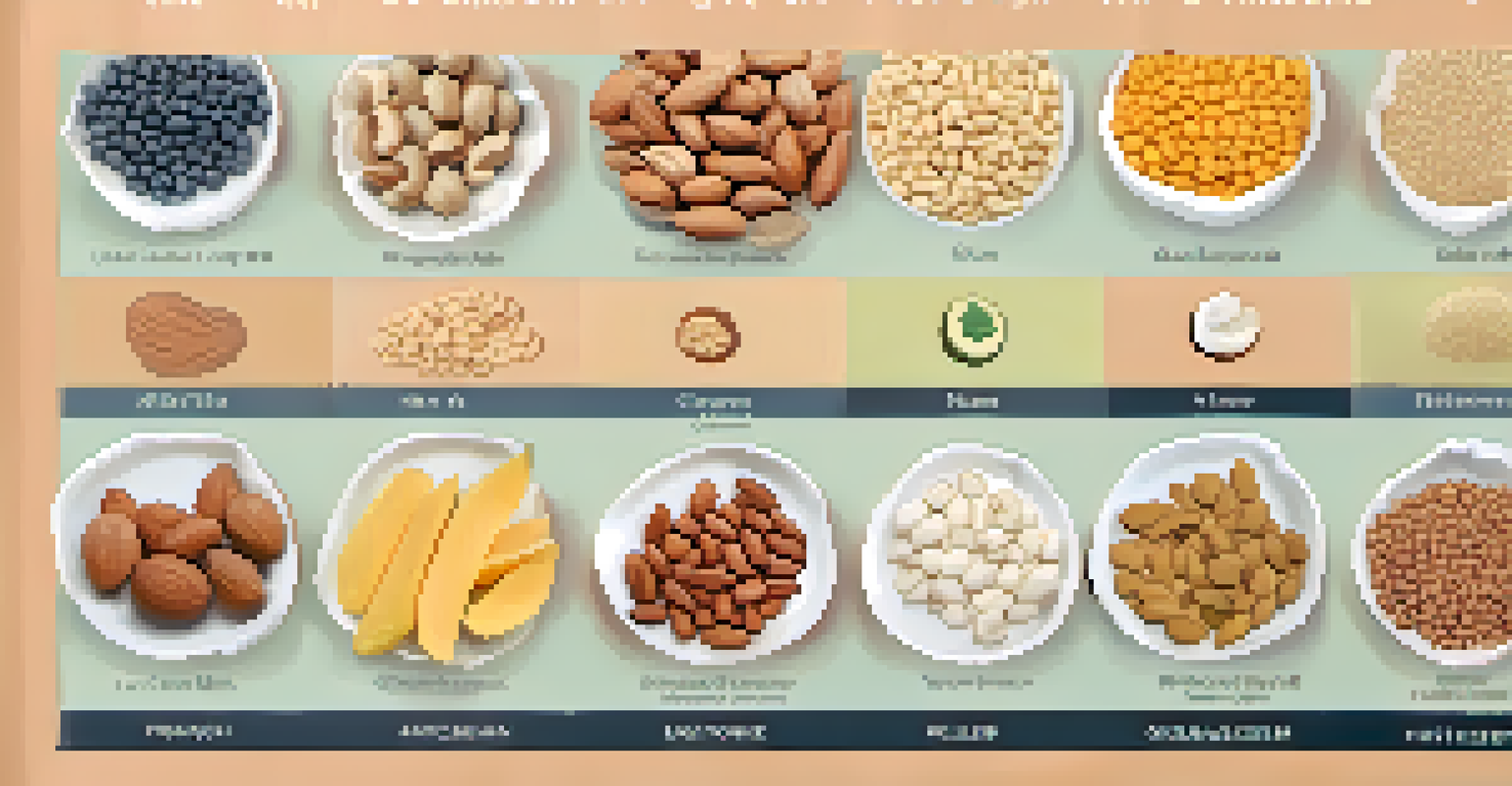Understanding Common Allergies in Vegetarian Diets

Introduction to Allergies in Vegetarian Diets
Many people choose vegetarian diets for health, ethical, or environmental reasons. However, it's essential to be aware of potential allergies that can arise from specific plant-based foods. Understanding these allergies can help ensure a balanced and safe vegetarian diet.
Let food be thy medicine and medicine be thy food.
Vegetarian diets often include a variety of grains, legumes, nuts, and soy products, any of which can trigger allergic reactions in sensitive individuals. This article aims to shed light on common allergies associated with vegetarian diets and offer tips for managing them. Let's dive into the key allergens you might encounter.
By recognizing these allergens, vegetarians can make informed choices and avoid unnecessary discomfort. It's all about enjoying a healthy lifestyle without compromising well-being.
Legume Allergies: A Common Concern
Legumes, including beans, lentils, and chickpeas, are staples in many vegetarian diets. While they're packed with protein and fiber, they can also be a source of allergies for some individuals. Symptoms may range from mild digestive issues to severe allergic reactions.

If you're allergic to legumes, it’s crucial to identify which specific type triggers your symptoms. For example, soy allergies are particularly common and can lead to reactions like hives or even anaphylaxis. Consulting with a healthcare provider can help pinpoint the cause and guide dietary adjustments.
Common Allergens in Vegetarian Diets
Vegetarian diets can include allergens from legumes, nuts, dairy alternatives, and gluten, making awareness essential for health.
Substituting legumes with safe alternatives, such as quinoa or certain grains, can maintain nutritional balance while avoiding allergens. This way, vegetarians can still enjoy a varied diet without the risk of allergic reactions.
Nuts and Seeds: Nutritional Powerhouses with Risks
Nuts and seeds are rich in essential nutrients, making them popular in vegetarian diets. However, they are also among the top allergens, with reactions ranging from mild irritation to life-threatening anaphylaxis. Common culprits include peanuts, tree nuts, and sesame seeds.
The food you eat can either be the safest and most powerful form of medicine or the slowest form of poison.
For those with nut allergies, it’s vital to read labels carefully, as many products may contain traces of nuts. The good news is that there are plenty of nut-free alternatives available, such as sunflower seeds or pumpkin seeds. These options can provide similar nutritional benefits without the risk.
Incorporating a variety of safe sources of protein and healthy fats can help maintain a balanced vegetarian diet. Always consult with a healthcare professional for personalized dietary guidance.
Dairy Alternatives and Potential Allergies
Though many vegetarians consume dairy, those who follow a strict vegan diet turn to plant-based alternatives. However, some individuals may experience allergies to common dairy substitutes like almond milk or soy yogurt. Identifying these allergies is crucial for maintaining overall health.
Symptoms of allergies to dairy alternatives can mimic those of traditional dairy allergies, including gastrointestinal distress or skin reactions. It’s essential to monitor how your body responds to different plant-based products. Keeping a food diary can help track any adverse reactions.
Identifying and Managing Allergies
Recognizing symptoms and keeping a food diary can help identify food allergies, facilitating safer dietary choices.
Fortunately, there are numerous non-dairy options available, such as oat milk or coconut yogurt, which may be better tolerated. Exploring various choices can help you find alternatives that suit your taste and dietary needs.
Gluten Sensitivity in Vegetarian Diets
Gluten sensitivity is another concern for some individuals on vegetarian diets. This protein is found in wheat, barley, and rye, which are commonly used in many vegetarian staples. For those with celiac disease or gluten intolerance, consuming gluten can lead to serious health issues.
Identifying gluten sensitivity often involves eliminating gluten-containing foods and monitoring symptoms. Many people find relief from digestive issues and fatigue when they remove gluten from their diets. Luckily, a growing number of gluten-free grains, such as rice and quinoa, can easily replace gluten-rich foods.
Navigating a vegetarian diet while avoiding gluten can be challenging, but with careful planning and the right resources, it's definitely achievable. Always consult a healthcare provider for testing and personalized dietary advice.
Identifying Food Allergies: Signs and Symptoms
Recognizing the signs of food allergies is vital for anyone following a vegetarian diet. Common symptoms can include hives, itching, abdominal pain, or respiratory issues after consuming certain foods. Understanding these signs can help you identify potential allergens more quickly.
If you suspect a food allergy, keeping a detailed food diary can be an effective strategy. Documenting what you eat and any symptoms that arise can help you and your healthcare provider pinpoint specific allergies. This process can lead to safer dietary choices.
Support for Allergy Management
Meal planning and seeking guidance from healthcare professionals can empower vegetarians to navigate their diets effectively.
Consulting an allergist for testing can provide clarity and guide you on how to avoid allergens effectively. Awareness is the first step toward a healthier and more enjoyable vegetarian lifestyle.
Tips for Managing Allergies in Vegetarian Diets
Managing allergies while maintaining a vegetarian diet doesn’t have to be overwhelming. Start by educating yourself about common allergens and their alternatives. This knowledge empowers you to make informed food choices that suit your dietary preferences and needs.
Meal planning can also be a game-changer. By preparing meals in advance, you can avoid accidental exposure to allergens and ensure your diet remains balanced. Utilizing tools like recipe apps can help you find allergy-friendly vegetarian dishes.

Lastly, don't hesitate to seek support from nutritionists or online communities. Sharing experiences with others facing similar challenges can provide valuable insights and encouragement. Remember, being proactive is key to enjoying a fulfilling vegetarian diet.
Conclusion: Staying Informed for a Healthy Vegetarian Lifestyle
Understanding common allergies in vegetarian diets is essential for maintaining a healthy lifestyle. By being aware of potential allergens and their symptoms, you can enjoy the benefits of a plant-based diet without compromising your health. Knowledge is power when it comes to food allergies.
Always prioritize communication with healthcare professionals to ensure you’re making safe dietary choices. They can provide tailored advice and support as you navigate your vegetarian journey. Whether it's experimenting with new ingredients or seeking alternatives, the options are plentiful.
Remember, your well-being is paramount. With the right strategies and support, you can thrive on a vegetarian diet while managing any allergies effectively.